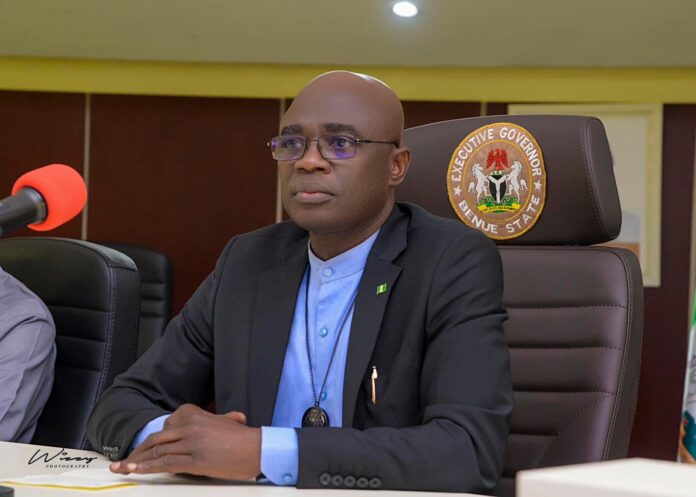Benue State Governor, Fr. Hyacinth Alia, has explained why the state’s 2017 anti-open grazing law is not working, saying that the state’s prohibition of open grazing is a local law which faces challenges in implementation.
He explained that the law, which was introduced by the immediate governor, Samuel Ortom, would only be effectively enforced if it were adopted as a national law.
Speaking through his Chief Press Secretary, Kula Tersoo, on Sunday, Alia responded to concerns raised by the Benue Advocacy Network over the persistent attacks by armed herders despite the existence of the law.
“The governor has been open with the people about the difficulty in implementing the anti-open grazing law because the enforcement body — the Benue State Community Volunteer Guards — are not authorised to bear sophisticated arms, except licensed firearms.
“But the challenge is that Fulani herders are often protected by armed militias wielding AK-47 and AK-49 rifles. If even mobile police officers have been killed confronting these militias, how do we expect the unarmed protection guards to enforce the law?” Tersoo said.
Alia maintained that effective enforcement of the law would require it to be adopted as a national policy, allowing federal security forces to intervene and enforce it across state lines.
“Imagine when our guards attempt to enforce the law, and the herders simply cross into neighbouring Nasarawa State, where the law doesn’t apply — what can we do?” he asked.
The governor’s comments followed a statement issued by the Benue Advocacy Network titled ‘Questions Governor Alia Is Yet To Answer’, and signed by its president, Enoch Ortese.
Ortese criticised the governor for the growing insecurity in rural areas, the continued expansion of internally displaced persons camps, and the failure to return IDPs to their ancestral homes — a key campaign promise.
“Instead of fulfilling his promise to return IDPs to their ancestral homes within his first 100 days, the governor is constructing more camps and tents,” the group said.
The group also accused the governor of lacking transparency in financial management, awarding contracts without public disclosure, and failing to complete any significant projects in the past two years.
“What has become of the Open Grazing Prohibition and Ranches Establishment Law of 2017? Why are herders increasingly taking over more Benue communities without any visible government action? The people deserve clarity,” the statement added.
Responding, Alia said the state’s financial records are available at the Budget Office for public scrutiny and noted that his administration has cleared six out of seven months of salary arrears owed by the previous government.
FROM HENRY IYORKASE, MAKURDI
Benue State Governor, Fr. Hyacinth Alia, has explained why the state’s 2017 anti-open grazing law is not working, saying that the state’s prohibition of open grazing is a local law which faces challenges in implementation.
He explained that the law, which was introduced by the immediate governor, Samuel Ortom, would only be effectively enforced if it were adopted as a national law.
Speaking through his Chief Press Secretary, Kula Tersoo, on Sunday, Alia responded to concerns raised by the Benue Advocacy Network over the persistent attacks by armed herders despite the existence of the law.
“The governor has been open with the people about the difficulty in implementing the anti-open grazing law because the enforcement body — the Benue State Community Volunteer Guards — are not authorised to bear sophisticated arms, except licensed firearms.
“But the challenge is that Fulani herders are often protected by armed militias wielding AK-47 and AK-49 rifles. If even mobile police officers have been killed confronting these militias, how do we expect the unarmed protection guards to enforce the law?” Tersoo said.
Alia maintained that effective enforcement of the law would require it to be adopted as a national policy, allowing federal security forces to intervene and enforce it across state lines.
“Imagine when our guards attempt to enforce the law, and the herders simply cross into neighbouring Nasarawa State, where the law doesn’t apply — what can we do?” he asked.
The governor’s comments followed a statement issued by the Benue Advocacy Network titled ‘Questions Governor Alia Is Yet To Answer’, and signed by its president, Enoch Ortese.
Ortese criticised the governor for the growing insecurity in rural areas, the continued expansion of internally displaced persons camps, and the failure to return IDPs to their ancestral homes — a key campaign promise.
“Instead of fulfilling his promise to return IDPs to their ancestral homes within his first 100 days, the governor is constructing more camps and tents,” the group said.
The group also accused the governor of lacking transparency in financial management, awarding contracts without public disclosure, and failing to complete any significant projects in the past two years.
“What has become of the Open Grazing Prohibition and Ranches Establishment Law of 2017? Why are herders increasingly taking over more Benue communities without any visible government action? The people deserve clarity,” the statement added.
Responding, Alia said the state’s financial records are available at the Budget Office for public scrutiny and noted that his administration has cleared six out of seven months of salary arrears owed by the previous government.

